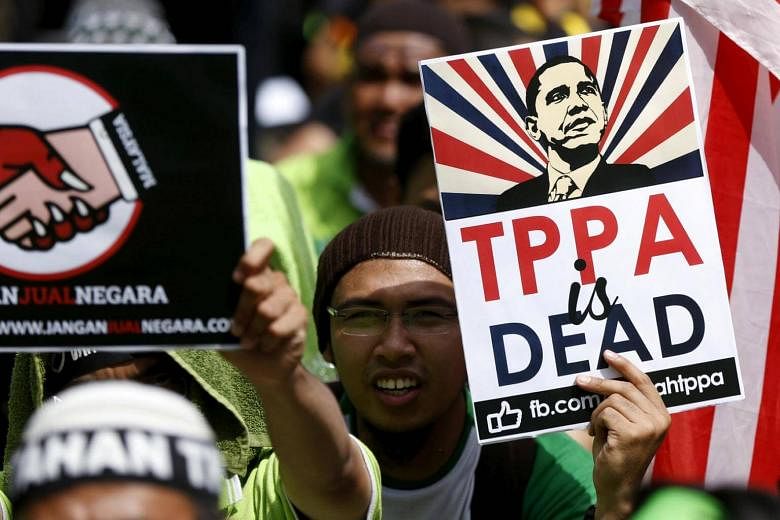KUALA LUMPUR • Malaysia said yesterday that it would focus efforts on wrapping up a multi-nation trade pact led by China, as the South-east Asian country braces itself for the possible collapse of the Trans-Pacific Partnership (TPP), spearheaded by the United States.
The comment comes after US President Barack Obama's administration suspended efforts to win congressional approval for the TPP before President-elect Donald Trump takes office, saying the pact's fate was up to Mr Trump and Republican lawmakers.
International Trade Minister Mustapa Mohamed said Malaysia was looking to push the Regional Comprehensive Economic Partnership (RCEP), mooted by China as part of its outreach to the 10-member Association of South-east Asian Nations (Asean).
"The current uncertain international economic situation has motivated and strengthened the resolve of RCEP countries, which are among the fastest-growing countries in the world, to continue working closely in reaching a conclusion of this trade agreement," Datuk Seri Mustapa said in a statement.
Mr Trump vowed to scrap the TPP several times during his campaign. Mr Mustapa's statement follows a raft of bilateral deals worth US$34 billion (S$48 billion) signed between Malaysia and China, in what is seen as a shift towards the Asian giant, and away from the US.
The deals were signed during a visit this month to China by Malaysian Prime Minister Najib Razak.
The TPP can proceed only if the US, which "constitutes about 60 per cent of the total TPP members' GDP", remains part of the deal, Mr Mustapa said.
The TPP is a landmark trade deal that the US signed with 11 Pacific Rim nations, including Singapore and Malaysia. However, the US has not ratified the pact.
The trade agreement can take effect only if ratified by at least six countries that have gross domestic product making up 85 per cent of the total GDP of the 12 countries in the pact, he added.
"There will be no TPP without the US' participation," Mr Mustapa said.
Signed in October last year after more than five years of negotiations among the 12 signatories, the TPP aims to cut trade barriers in some of Asia's fastest-growing economies and boost ties with US allies in the region, in the face of China's rising influence.
Mr Mustapa said a clearer picture of the state of the TPP was expected to emerge during discussions on the sidelines of next week's Asia-Pacific Economic Cooperation Summit in Lima, the Peruvian capital.
Separately, in an interview with Japan's Nikkei Asian Review, Datuk Seri Najib said it was unlikely that the TPP would come into effect, but that Malaysia remained committed to boosting its ties with the US and the other 11 TPP signatory countries.
He wrote in an e-mail interview with Nikkei: "Whether TPP proceeds or not, we remain committed to strengthening our economic and trade ties with the US and the other countries involved."
Alluding to concerns that Malaysia is tilting towards China in its relations, Mr Najib said that, while Malaysia was strengthening its relations with Beijing, this would not be at the expense of ties with other nations.
The stronger ties with Beijing are "not surprising given that China is our largest trading partner and accounts for over 15 per cent of trade outside our borders", he said.
"And, as far as the United States is concerned, this is a relationship we place great importance on. Indeed, this is reflected by the elevation of our bilateral relationship to a comprehensive partnership in 2014," he added.
REUTERS

